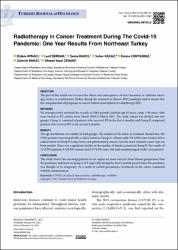| dc.contributor.author | Aynacı, Özlem | |
| dc.contributor.author | Serdar, Lasif | |
| dc.contributor.author | Rakıcı, Sema | |
| dc.contributor.author | Kazaz, Seher | |
| dc.contributor.author | Canyılmaz, Emine | |
| dc.contributor.author | Bahat, Zümrüt | |
| dc.contributor.author | Zengin, Ahmet Yaşar | |
| dc.date.accessioned | 2022-11-19T18:17:48Z | |
| dc.date.available | 2022-11-19T18:17:48Z | |
| dc.date.issued | 2022 | en_US |
| dc.identifier.citation | Aynaci, O., Serdar, l., Rakici, S., Kazaz, S., Canyilmaz, E., Bahat, Z. & Zengin, A.Y. (2022). Radiotherapy in Cancer Treatment During The Covid-19 Pandemic: One Year Results From Northeast Turkey. Türk Onkoloji Dergisi-Turkish Journal of Oncology, 37(2), 200-207. http://doi.org/10.5505/tjo.2022.3463 | en_US |
| dc.identifier.issn | 1300-7467 | |
| dc.identifier.uri | http://doi.org/10.5505/tjo.2022.3463 | |
| dc.identifier.uri | https://hdl.handle.net/11436/7082 | |
| dc.description.abstract | OBJECTIVE
The goal of this article was to assess the effects and consequences of strict measures in radiation oncology centers in northeastern Turkey during the coronavirus disease-2019 pandemic and to ensure that the reorganization of programs occurred without interruption to radiotherapy (RT).
METHODS
We retrospectively reviewed the records of 1063 patients (median age 63 years; range 3-93 years) who were treated in RI centers from March 2020 to March 2021. The study cohort was divided into two groups: Group A consisted of patients who received RT in the first 6 months and Group B comprised patients who received RT in the second 6 months.
RESULTS
The age distribution was similar in both groups. The analysis of the intent of treatment showed that 585 (55%) patients were treated with a radical intent in Group A, whereas only 478 (45%) were treated with a radical intent in Group B. Lung, breast, and genitourinary cancers were the most common cancer types in both periods. There was a significant decline in the number of female patients in Group B. Test results of 31 (2.9%) patients, 8 (25.8%) women and 23 (74.2%) men, who had nasopharyngeal swabs, were positive.
CONCLUSION
This study shows that oncology patients in our region are more worried about disease progression than the pandemic and insist on going to RT, especially during the first 6-month period when the pandemic was thought to be temporary. As a result of careful precautions, treatments in the clinics continued without contamination. | en_US |
| dc.language.iso | eng | en_US |
| dc.publisher | Kare Publishing | en_US |
| dc.rights | info:eu-repo/semantics/openAccess | en_US |
| dc.subject | COVID-19 | en_US |
| dc.subject | Clinical characteristics | en_US |
| dc.subject | Radiotherapy | en_US |
| dc.subject | Workflow | en_US |
| dc.title | Radiotherapy in cancer treatment during the covid-19 pandemic: One year results from Northeast Turkey | en_US |
| dc.type | article | en_US |
| dc.contributor.department | RTEÜ, Tıp Fakültesi, Dahili Tıp Bilimleri Bölümü | en_US |
| dc.contributor.institutionauthor | Rakıcı, Sema | |
| dc.identifier.doi | 10.5505/tjo.2022.3463 | en_US |
| dc.identifier.volume | 37 | en_US |
| dc.identifier.issue | 2 | en_US |
| dc.identifier.startpage | 200 | en_US |
| dc.identifier.endpage | 207 | en_US |
| dc.relation.journal | Türk Onkoloji Dergisi-Turkish Journal of Oncology | en_US |
| dc.relation.publicationcategory | Makale - Uluslararası Hakemli Dergi - Kurum Öğretim Elemanı | en_US |


















